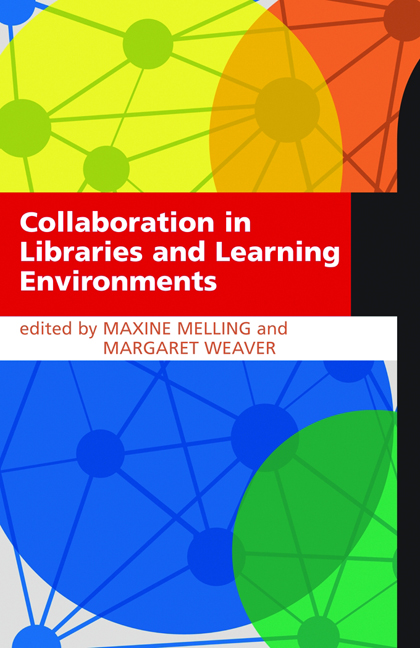Book contents
- Frontmatter
- Contents
- Contributors
- Introduction
- Abbreviations
- 1 The changing higher education context
- 2 Connecting with the student perspective
- 3 Working with professional associations
- 4 Culture, values and change: observations from three consortia in Canada
- 5 Managing complex change collaboratively
- 6 Leadership skills for collaboration: future needs and challenges
- 7 Knowing me … knowing you: the role of technology in enabling collaboration
- 8 Space: changing the boundaries
- 9 Collaborative service provision through super-convergence
- 10 Joint-use libraries and transformational change
- Index
6 - Leadership skills for collaboration: future needs and challenges
Published online by Cambridge University Press: 08 June 2018
- Frontmatter
- Contents
- Contributors
- Introduction
- Abbreviations
- 1 The changing higher education context
- 2 Connecting with the student perspective
- 3 Working with professional associations
- 4 Culture, values and change: observations from three consortia in Canada
- 5 Managing complex change collaboratively
- 6 Leadership skills for collaboration: future needs and challenges
- 7 Knowing me … knowing you: the role of technology in enabling collaboration
- 8 Space: changing the boundaries
- 9 Collaborative service provision through super-convergence
- 10 Joint-use libraries and transformational change
- Index
Summary
Introduction
This book explores the changing context of public services, and more specifically higher education, arguing that collaboration is the critical issue for the ongoing transformation and success of libraries, learning environments and learning services. This chapter explores these new demands on the people who work, and who potentially will work, in such services. Its central argument is that leadership development for collaboration, rather than leadership in general, is the single biggest issue and the single greatest lever for success in the future. Leadership and leaders at all levels are required when working across boundaries and when working in an increasingly diverse environment. This chapter explores this challenging issue in a global context, a context that demands increased flexibility when collaborating with diverse professional groups and where the boundaries of territory and service delivery become increasingly permeable. It will explore and provide models to help us consider these skills, attributes and behaviours indicating that certain approaches are transferable, transformational and sustainable across many kinds of libraries and learning environments. It will also discuss the significance of diversity and difference for leadership and suggest ways in which we can develop as individuals and as organizations in order to ensure effective collaboration and boundary crossing.
The leadership context: general observations
Several authors (including several of the contributors to this volume) have proposed that leadership is fundamental to the present and future development of library and information services – across all sectors – and to the future of public services in general. Yet this obsession with leadership, which pervades all aspects of our lives, conveys a disillusionment both with leaders in the current and recent global context and with models of leadership (Sinclair, 2007). There has been a cynicism and scepticism towards political and business leaders as we ask ‘Has leadership failed? Or worse, is it simply absent?’ (Walsh, 1994, 24); this has been exacerbated during the global financial crisis of the 21st century. The literature illustrates how much people and organizations expect from their leaders (see Kouzes and Posner, 2003), yet how often those expectations are not met.
- Type
- Chapter
- Information
- Collaboration in Libraries and Learning Environments , pp. 87 - 102Publisher: FacetPrint publication year: 2012

